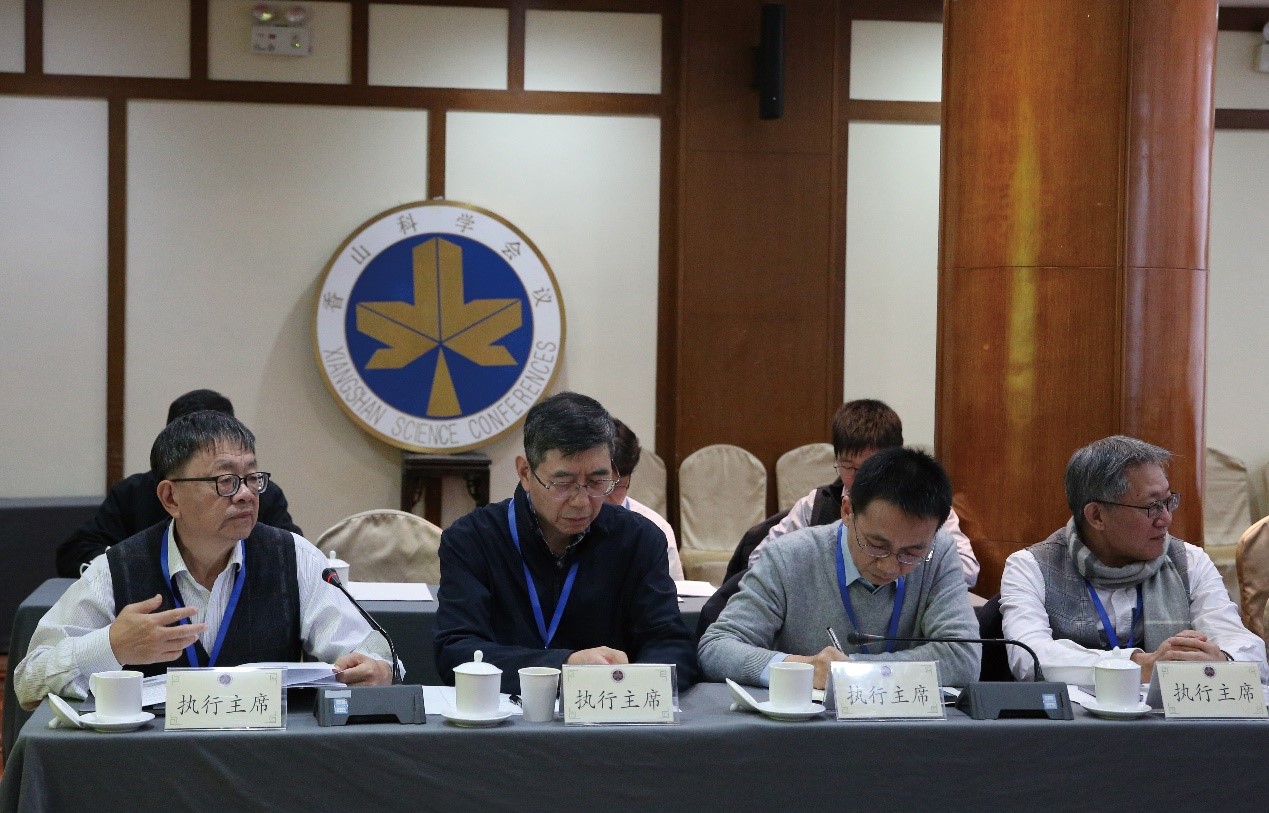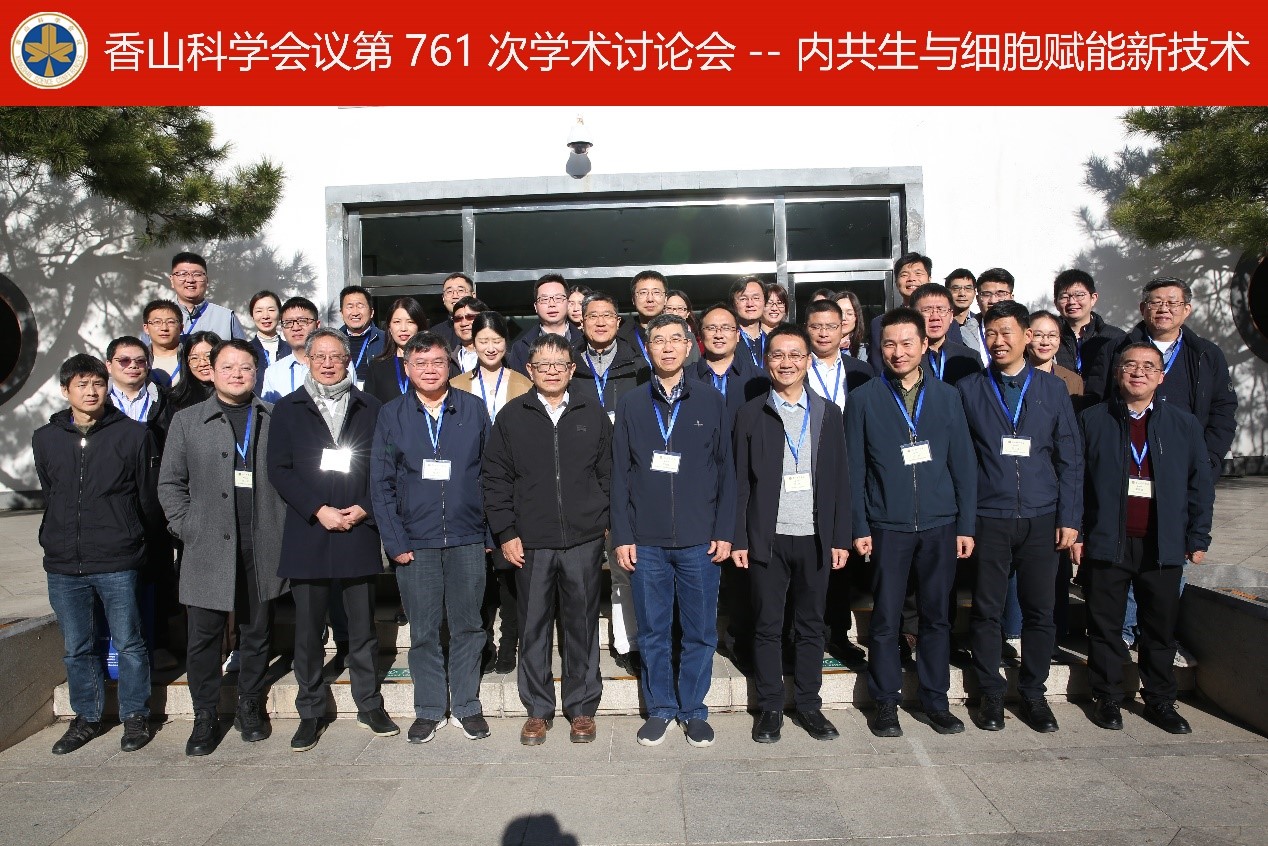
Newsroom
Xiangshang Science Conference Discusses New Technologies in Endosymbiosis and Cell Empowerment

The 761st Xiangshang Science Conference was chaired by Prof. ZHAO Jindong, Prof. ZHANG Xian'en, Prof. MIAO Wei, and Prof. ZHANG Chengcai (L-R).
The 761st Xiangshang Science Conference, themed "Endosymbiosis and New Technologies in Cell Empowerment," was successfully held in Beijing on November 21-22, 2024. The conference was chaired by distinguished experts, including Prof. ZHAO Jindong (CAS member) from the Institute of Hydrobiology (IHB) of the Chinese Academy of Sciences (CAS) and Peking University, Prof. ZHANG Xian'en from the Institute of Biophysics, CAS, Prof. MIAO Wei from IHB, and Prof. ZHANG Chengcai from IHB.
Over 40 experts and scholars from more than 20 institutions across China attended the event, alongside staff from the CAS Bureau of Frontier Sciences and Basic Research, the National Natural Science Foundation of China (NSFC), and the China Biotechnology Development Center. The discussions focused on three central topics: the mechanisms of biological endosymbiosis, the construction of artificial symbionts, and the application of cell empowerment technologies.
Prof. ZHAO Jindong opened the conference with a presentation titled "Endosymbiosis and Its Significance in Biological Evolution," where he discussed the crucial role of endosymbiosis in the origin of life and the evolution of eukaryotic organisms. He highlighted recent research advancements and ongoing debates in the field, emphasizing that the study of endosymbiosis represents a key frontier in basic research and offers substantial potential for practical applications. Zhao expressed hope that the conference would accelerate the development of this area and foster technological innovation.
Prof. MIAO Wei delivered a keynote titled "Endosymbiosis-Based Cell Empowerment Technology," explaining how biological endosymbiosis has driven the emergence of complex life forms and endowed hosts with novel functions. Miao pointed out that endosymbiosis offers new pathways for developing innovative foundational biotechnologies, and engaged in thoughtful dialogue with fellow experts.
In the session on "Mechanisms of Biological Endosymbiosis," Prof. ZHANG Chengcai presented a report on the evolutionary role of endosymbiosis, particularly focusing on the importance and application potential of cyanobacterial symbiosis. Profs. WANG Ertao from the CAS Center for Excellence in Molecular Plant Sciences, WANG Xiaoxue from the CASSouth China Sea Institute of Oceanology, and ZHAO Fangqing from the CAS Institute of Zoology provided insights into plant, animal, and protozoan endosymbiosis systems and discussed approaches for their utilization and modification.
During the "Construction of Artificial Symbionts" session, Prof. HUANG Kaiyao from IHB outlined recent progress, strategies, challenges, and solutions in constructing artificial symbionts. Profs. LIU Xingguo from the CAS Guangzhou Biomedicine and Health Institute, LIN Qiang from the CAS South China Sea Institute of Oceanology, and LI Xiaobo from West Lake University shared their findings on mitochondrial reconstruction, algae/chloroplast-animal symbiosis systems, and photosynthetic mammalian cells.
In the final session on "Application Scenarios for Cell Empowerment Technologies," Prof. ZHOU Min from Zhejiang University presented on the application of microalgae as natural drug delivery carriers, emphasizing their potential for targeted drug delivery. Prof. LIN Xianfeng from Zhejiang University and Prof. LIU Luning from the University of Liverpool shared updates on "Phototherapy" and "Reconstruction of Carbon Fixing Carboxysomes," respectively.
The conference followed the tradition of the Xiangshang Science Conference Series, featuring lively and in-depth discussions. Experts from various fields exchanged ideas and insights, reaching a consensus that principles of biological endosymbiosis present promising opportunities for the development of novel cell empowerment technologies. The conference also addressed challenges and explored future directions for these technologies.
The Xiangshan Science Conference, established in April 1993 under the joint leadership of the Ministry of Science and Technology and the Chinese Academy of Sciences, is a prestigious and high-level academic event. Known for its interdisciplinary and small-scale format, the conference aims to explore scientific frontiers and promote knowledge innovation.

A group photo of all the attendees